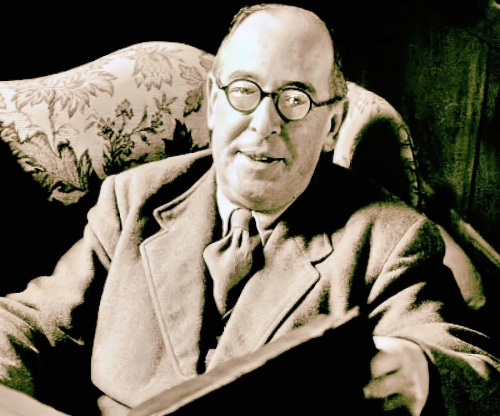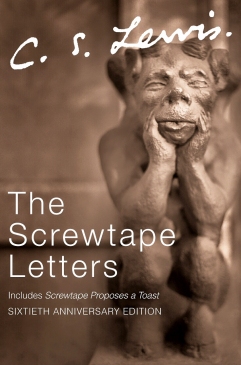by David Eaton
 I’m a latecomer to the writings of C. S. Lewis, but through the prompting of my eldest daughter, I finally took the plunge. Putting the finishing touches on my own book, I was looking for several religious-based literary references regarding the perils of postmodernism that might support some of my contentions regarding music, aesthetics, radical egalitarianism, multiculturalism, and the pervasive influence of the celebrity-industrial-complex.
I’m a latecomer to the writings of C. S. Lewis, but through the prompting of my eldest daughter, I finally took the plunge. Putting the finishing touches on my own book, I was looking for several religious-based literary references regarding the perils of postmodernism that might support some of my contentions regarding music, aesthetics, radical egalitarianism, multiculturalism, and the pervasive influence of the celebrity-industrial-complex.
Lewis’ work, especially, The Screwtape Letters (1942) and its sequel, Screwtape Proposes a Toast (1959), provide a trove of insight in the examination of the whys and wherefores of our “fallen” condition in the context of “right and wrong as a clue to the meaning of the universe.”
Lewis admitted that writing The Screwtape Letters was simultaneously the easiest, but least enjoyable work of his career. He apparently went into deep depression after writing it. Given the brilliant exegesis of how the “Lowerarchy” of Satan effectively infects the human soul, it’s no wonder why. The Cold War was the backdrop of the sequel and the narrative of how leftist, neo-Marxist thought subverted academia and the intellectual class in the West underscores Lewis’ work here. The sequel is more ideologically-charged than the original and the perspicacious insights are like a punch in the gut that leaves you breathless — and somewhat forlorn.
The Screwtape Letters are a series of 31 letters written by a senior demon, Screwtape, to his nephew, Wormwood. The nephew is a younger and less experienced demon, tasked with guiding a man (called “the patient”) toward “Our Father Below” (Satan) and away from “the Enemy” (God.) As Wormwood’s mentor, Screwtape explains many tricks-of-the-trade to his young charge in the process of inculcating him with methods of “the Lowerarchy” (Hell).
In the preface to The Screwtape Letters, Lewis states there are “two equal and opposite errors into which our race can fall” when we contemplate Satan. One is to deny Satan’s existence, the other is “to feel an excessive and unhealthy interest” in him. The first error is Satan’s greatest ploy — if he doesn’t really exist, why fret about him? The second error is that we too easily create common bases with the dark side by our “unhealthy interest” in him.
With regard to the first error, I’m reminded of Mick Jagger’s lyric in the Rolling Stones’ “Sympathy for the Devil”:
“Pleased to meet you, Hope you guess my name.
What’s puzzling you, Is the nature of my game.”
The pertinent issue is just how much does the devil, Lucifer, influence our behavior. As Lewis avers, too often we’re in the dark about the nature of Satan’s games and when that happens, we lose.
Screwtape Letter 1
In the first letter, Screwtape refers to a time past when humans “still knew pretty well when a thing was proved and when it was not; and when it was proved they really believe it. They still connected thinking with doing and were prepared to alter their way of life as the result of a chain of reasoning.” In a deep bow to postmodernism (philosopher Michel Foucault in particular), the senior devil declares that modern man “doesn’t think of doctrines as primarily ‘true’ or ‘false,’ but as ‘academic,’ or ‘practical,’ ‘outworn’ or ‘contemporary,’ ‘conventional,’ or ‘ruthless.’ Hence, “jargon, not argument” is Satan’s best aid “in keeping man from church.”
A significant aspect of the postmodern mindset is that “universals” and “immutable truths” are “bourgeois” concepts born of the religion beliefs of “the old world.” Screwtape understands that reason, and its cousin, argument, can lead the patient to truth and/or knowledge, and this is how “the Enemy” maintains control. To usurp that control it’s better to keep one’s patient in a state of relativist thinking and “encourage him to think about realities he can’t touch or see,” or to make him think that “he already knows everything.”
This is a characteristic of many an academic liberal arts curricula, in which moral relativism and situational ethics are linked to various grievances associated with race, ethnicity, gender, etc. Resentment is the opiate of the postmodern left. Screwtape also cautions against “the patient” pursuing the natural sciences for fear of exposing him to immutable truths. “If he must dabble in science,” Screwtape advises, “keep him on economics and sociology,” two highly theoretical realms of thought given to subjective, interpretive and politically-correct “jargon.” At one point Screwtape reminds Wormwood of his nefarious task: “But remember, you are there to befuddle him.”
In yet another warning against the pursuit of reason and argument, Screwtape instructs: “The trouble with argument is that it moves the whole struggle on the Enemy’s own ground.” For the postmodernist, truth is fungible this points to the postmodern meme that words (discourse) are used, not to arrive at a particular truth, but to advance a particular agenda or maintain or exert political power. Manipulation is the goal — and it’s decidedly psychopathic. Foucault argued that power and knowledge are interrelated and he connects the role of discourse in wider social processes “of legitimating power, emphasizing the construction of current truths, how they are maintained and what power relations they carry with them.”
Musicologist Charles Rosen observes that one of the “unsavory” aspects of contemporary sociological criticism of the sort Screwtape advocates is the attempt to debunk the idea that there exists true genius in the work of great artists and that the “genius” tag appropriated to the likes of Beethoven or Shakespeare “is entirely due…to a process of brainwashing by the cultural elite in power.” This creates the condition where, as Rosen observes, “commonly shared and recognized values can be dismissed since these values are simply a successful imposition by an elite upon society as a whole.”
Moreover, any belief in “certainty” on any particular issue quickly leads to charges of extremism, intolerance or fascist authoritarianism. This is right out of the contemporary, progressive, multiculturalist playbook and it’s pervasive in liberal arts academia.
Screwtape Letter 20
Here, Screwtape explains to his young nephew about the type of “physical attributes” that women should have in order seduce men into the false reality of “falling in love.” The senior devil instructs his nephew that the type of woman “is a question decided for us by the spirits far deeper down in the Lowerarchy than you and I. It is the business of these great masters to produce in every age a general misdirection of what may be called ‘sexual taste.’ They do this by working through the small circle of popular artists, dressmakers, actresses and advertisers who determine the fashionable type. The aim is to guide each sex away from those members of the other with whom spiritually helpful, happy and fertile marriages are most likely.”
And Screwtape acknowledges
“It is all fake, of course, the figures in the popular art are falsely drawn… As a result we are more and more directing the desires of men to something which does not exist — making the role of the eye in sexuality more and more important and at the same time making its demands more and more impossible. What follows you can easily forecast! This is the general strategy of the moment.”
How insightful; and that “moment” continues — unabatedly. There is, as we know, empirical data that demonstrates that family breakdown results in higher instances of crime, addictions, promiscuity, poor academic achievement, more divorce, and a host of other social maladies. Much of this is due to the objectification (“reification” as sociologist/composer Theodor Adorno calls it) of sex. After all, Screwtape and the Lowerarchy are fully aware it’s not possible to respect and objectify someone at the same time.
Objectification of this sort ultimately undermines the carefully crafted ideal of “the Enemy;” namely, that family values and sexual probity are the foundational pillars of a moral society. By diminishing these virtues, Wormwood’s patient becomes all the more coarse, superficial and deluded by unattainable sexual fantasies. Values become subsidiary to sexual conquest. Notice too it is the artistic profession and Madison Avenue that collaboratively aid and abet the devil’s delusion.
Screwtape Letter 22
“Music and silence — how I detest them both.” Screwtape prefers Noise! “Noise — which alone defends us from silly qualms, despairing scruples and impossible desires. We will make the whole universe a noise in the end,” he says.
Screwtape seems to fully comprehend the power of music and its ability to uplift, inspire and edify — to put the patient in touch with truth, goodness and his own divinity via the transcendent aspects of beauty. Screwtape intuits that silence affords the patient time to become contemplative and to ponder eternal verities. Music conjures the idea of being a co-creator with God. This gives the patient a sense of value, which is anathema to despair, resentment and hopelessness, the emotions that give rise to revolutionary impulses — the impulses that are necessary to evoke rage and destroy the old world and its ties to the domain of “the Enemy.” This must be avoided — crushed.
“The melodies and silences of heaven will be shouted down in the end,” Screwtape proclaims, “we are not yet loud enough.” This is the noise of Critical Theory as espoused by the neo-Marxists of the Frankfurt School, including Adorno, psychologist Erich Fromm, and especially political philosopher Herbert Marcuse, who shouted down all claims that mitigated against progressive postmodernism.
Screwtape Proposes a Toast
I’ll focus from this Screwtape Letters sequel on just one important point: celebrity.
In it, Screwtape opines:
“As great sinners grow fewer, and the majority lose all their individuality, the great sinners become far more effective agents for us. Every dictator or even demagogue — almost every film-star or crooner — can now draw tens of thousands of human sheep with him. They give themselves to him…in him, to us… Catch the bell-wether and his whole flock comes after him (or her.) This has been our answer — and a magnificent answer it is.”
In his autobiography, our Founder says:
“People often think that politics moves the world, but that is not the case. It is culture and art that move the world. It is emotion, not reason, that strikes people in the innermost part of their hearts. When hearts change and are able to receive new things, ideologies and social regimes change as a result.”
(Sun Myung Moon, As a Peace-Loving Global Citizen)
This points yet again to the power of art and music in shaping attitudes and forging a cultural identity. Values matter. Our identities are determined by what we value, what we treasure, what we love. St. Augustine averred that people, and by extension, nations fail because they choose to love the wrong things. In this context, the cultural power of the “celebrity industrial complex” cannot be easily dismissed. A central tenet of Divine Principle is that by creating a common base with Satan we allow our better selves to be diminished by engaging in selfish acts. Ego is the artist’s Achilles heel, as Screwtape surely knew. Celebrity is the hook that Satan uses to feed the artists ego and to fetter the conscience of the masses. Madison Avenue and Hollywood have become the epicenters of cultural choice and serious purveyors of what columnist David Brooks calls “The Big Me.”
I’m often asked if my creative endeavors are affected by my social environment and are thus a reflection of the world around me (a passive reality), or do I seek to effect change in the world through that which I create (an active reality). I believe it is both. Obviously, we are affected by our surroundings, but we are also capable of changing them to varying extents. Musicians must be especially attuned to this concept due to the powerful effect music can have on our consciousness.
Understanding the moral and ethical power of music, or the verities of sacred truths, or the true purpose of sexuality and its effects on self and society, is, however, not solely God’s province. Screwtape and the central figures of the Lowerarchy understood all of this as well. It’s important that we remember “the nature of their game.”
Thanks to the prescient C. S. Lewis for the reminder.♦
David Eaton has been Music Director of the New York City Symphony since 1985. In addition to his conducting career, he has been an active composer, arranger and producer with 47 original compositions and over 600 arrangements and transcriptions to his credit.
Photo at top: C. S. Lewis



David, this is a superbly crafted essay and a great tribute to the brilliant work of C. S. Lewis.
I applaud your daughter for recommending him to you. Many of us can benefit from reading or re-reading Lewis to relate his insights with our contemporary cultures. In the field of literature, the work of Derrida and “Deconstruction” served to undermine transcendent values represented
in literary works and by traditionalist critics such as Myron Abrams. Studying Divine Principle at the seminary helped me to process and critique these university discourses more clearly than I ever could when I was a young person going through public school education.
Most importantly to me was the identification of “Satan” which Lewis’ dialogues and letters expose. These insights explain the power of Divine Principle to instruct us in providential contexts. When I look back at the way education and culture powerfully influenced me as an American teenager, I remember the high school economics teacher who had us glorifying the five-year collectivization of farms in Soviet Russia, the senior year English teacher who always referred to Erich Fromm’s Escape from Freedom and then the college philosophy professor who announced on the first day of class that he did not believe in absolute values…and so on. Thank God I was beginning to awaken from unconsciousness and consciously chose to drop that philosophy class in my first week of college.
Thanks so much, David. I also am a great fan of C. S. Lewis’ writings, and turn to them often for a jolt of Transcendence.
Here’s a similar passage from a favorite Lewis book, called The Great Divorce. The context is that a heavenly spirit (restored person) who was an artist is witnessing to a ghost (still fallen person) who was also an artist and is now on the border of Heaven. It covers both art and theology. Here’s the passage (p. 80):
“Light itself was your first love: you loved paint only as a means of telling about light.” “Oh, that’s ages ago,” said the Ghost. “One grows out of that…. One becomes more and more interested in paint for its own sake.” “One does, indeed…. Every poet and musician and artist, but for Grace, is drawn away from love of the thing he tells, to love of the telling till, down in Deep Hell, they cannot be interested in God at all but only in what they say about Him. For it doesn’t stop at being interested in paint, you know. They sink lower — become interested in their own personalities and then in nothing but their own reputations.”
Couldn’t agree more, David. C. S. Lewis’s writings are precious. Anybody ever read his sci-fi trilogy? Brilliant!
Hillsdale College is giving a free online course on C. S. Lewis, for those that are interested.
By way of some kind of introduction, C. S. has ever felt the friend to me. That said, Screwtape and his letters have seemed unfinished inner wranglings upon my readings of such over the years. His other writings would seem to be more meaningful and lasting in my own, surely feeble estimation.
The observation (consequent or prescient) that “argument for the sake of argument” meted out by philosophers and others of ignominy or evil intent (cheered on by the Devil himself) is surely contextual.
In this case, Mr. Eaton is near the eve of publishing his own tome on culture, particularly, music and the corruption of such by power elites within the context of general deterioration, “Godlessness.”
Ultimately, it should be undeniable — by all sides of any argument or instigator(s) of such — the heart knows what the heart wants (ergo, God, too).
Sadly, we live in a world where such is not “self-evident”, but within public arenas anyways, must be argued, wrangled with and spun about rigorously.
Privately, personally, we band of brothers and sisters, we happy few, know otherwise. Heart and love within the universal balance found in the context of our lasting true parental legacy; sustains and ever . . . encourages our movement . . . forward.
My sincere best wishes for the success of Mr. Eaton’s continuing endeavors.
And to all ever walking that upward, challenging path.
I would just say that “argument for the sake of argument” was not always the intent of philosophers. There were some who were sincerely trying to ascertain the “meaning of life” or other issues regarding the human condition. Even in our UC culture we argue (debate) various issues in the attempt to arrive at better understandings and applications of our theology. For instance, what is “headwing” ideology? The debate rages.
Henri,
Yes, I agree the sci-fi trilogy is a masterwork. It’s been a long time since I read it, but find its account of the Fall (happily prevented this time) in the middle book Perelandra to come often to mind when teaching or researching about our Chapter 2. The third book, with its restoration of marriage (among many other themes), is a great story of today’s providence….